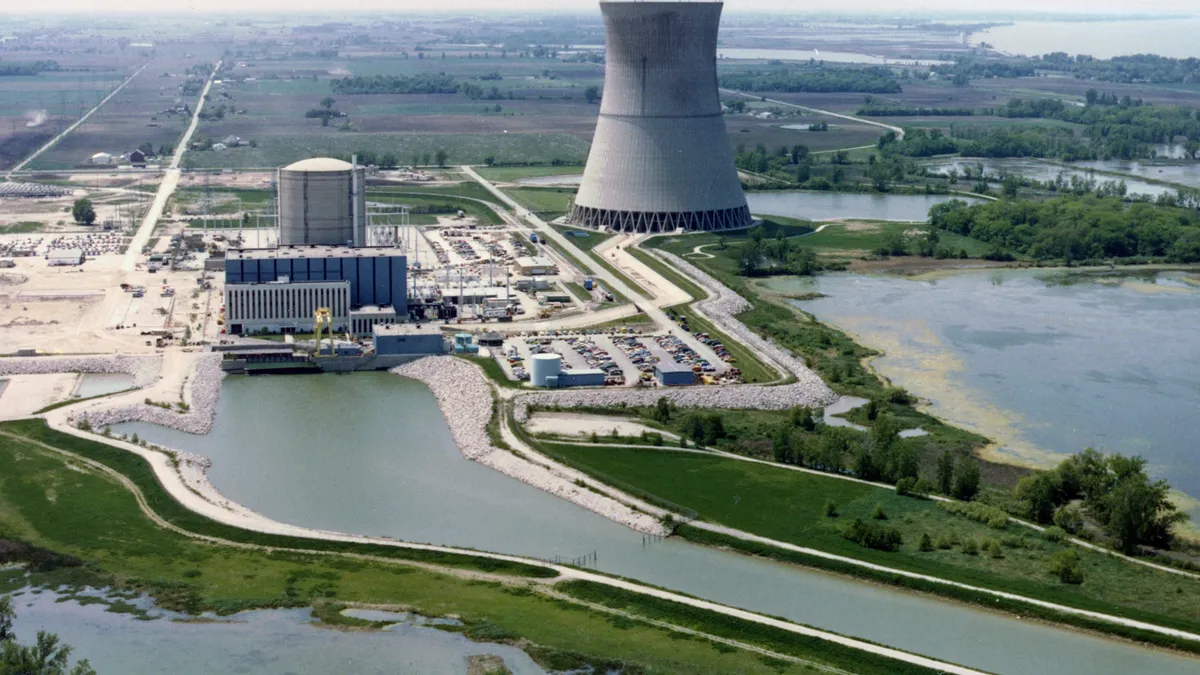Dive Brief:
- The Ohio House Energy and Natural Resources Committee on Thursday passed a clean energy bill seen by many as a subsidy for FirstEnergy Solutions' (FES) failing nuclear plants.
- Although HB 6 has the governor's support, the measure's fate depends on the compromises that Republicans will strike with free-market proponents in the Senate who are ideologically opposed to subsidies. The bill aimed to reward FES' Davis-Besse and Perry nuclear power plants for their clean, baseload generation although cheaper natural gas and renewable resources made the plants uneconomic in PJM's wholesale market.
- The House committee on Wednesday accepted an amendment to create a new tax on Ohioans to provide the majority of $190 million per year to the plants. The bill originally sought to also benefit solar, hydropower and other qualifying low emissions projects through a $300 million clean air fund.
Dive Insight:
The latest version of HB 6 has been criticized for acting solely as a nuclear subsidy bill. The legislation builds on other state actions to subsidize nuclear and coal capacity that continues to be uncompetitive in wholesale markets.
"The latest substitute version of Ohio's House Bill 6 drops all pretense of being a clean air program and now blatantly bails out FirstEnergy's aging nuclear plants and subsidizes Ohio's (and even Indiana's) dirtiest coal facilities," Dick Munson, Environmental Defense Fund's (EDF) Midwest clean energy director, said in a statement.
FES, the former merchant generation arm of FirstEnergy, is considering the early retirement of the 908 MW Davis-Besse plant, the 1,268 MW Perry plant and a 1,872 MW nuclear plant in Pennsylvania. The Ohio plants are responsible for 90% of the state's emissions-free capacity, according to FES.
The company has been taking steps to prematurely close down all three power plants, submitting its Certified Fuel Handler Training and Retraining Program to federal regulators in April. The plan calls for shuttering Davis-Besse in May 2020, followed by Perry and Unit 1 of Beaver Valley in May 2021, and Beaver Valley's Unit 2 in October 2021.
The earliest that HB 6 can come to the floor is on Tuesday, Munson told Utility Dive.
"There's even more free-market conservatives in the Senate than in the House," Munson said, adding that one option which could garner more conservative support would be to strip away the allocation of other funding besides the bill's nuclear subsidies.
The Davis-Besse and Perry plants pushed the company into Chapter 11 a year ago, and FES is finally nearing a bankruptcy deal with its former parent company.
"FirstEnergy feels as though it's facing a deadline and is pushing quite hard," Munson said.
Representatives of FES and the plants have testified before the committee in support of the bill.
"We have been proactively engaged in the political process to find a legislative solution to keep our plants open and save 4,300 jobs," Angela Pruitt, FES spokesperson, told Utility Dive via email.














